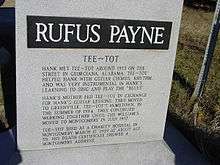Rufus Payne
Rufus "Tee Tot" Payne (February 4, 1883 – March 17, 1939) was an early 20th-century African-American blues musician from Greenville, Alabama who was more widely known by his nickname Tee Tot.
Rufus Payne | |
|---|---|
 Rufus Payne was buried in Lincoln Cemetery located in Montgomery, Alabama. This is the marker placed near his final resting place. | |
| Background information | |
| Birth name | Rufus Payne |
| Also known as | Tee Tot |
| Born | February 4, 1883 Greenville, Alabama, US |
| Origin | Montgomery, Alabama, US |
| Died | March 17, 1939 (aged 56) Montgomery, Alabama, US |
| Genres | Blues, gospel, country |
| Occupation(s) | Singer-songwriter, musician |
| Instruments | Vocals, guitar |
| Associated acts | Hank Williams |
Payne's nickname of "Tee Tot" is a pun for "teetotaler". It is said that Payne received his nickname because he usually carried a homemade mixture of alcohol and tea wherever he went.[1]
Early life
According to Alabama historian Alice Harp, Payne was born in 1883 on the Payne Plantation in Sandy Ridge, Lowndes County, Alabama.[2]
Career and influence
Some say Tee Tot played the blues alone, others state that he led a little combo that played pop songs and hokum numbers and was a street musician.
Tee Tot is best known for being a mentor to Hank Williams. Rufus Payne met Hank Williams when Hank was eight years old and legend has it he would come around and play Hank's guitar, showing Hank how to improvise chords. His influence in exposing Williams to blues and other African American influences helped Williams successfully fuse hillbilly, folk and blues into his own unique style, which in turn expanded and exposed both white and black audiences to the differing sounds.
Death
Payne died at a charity hospital in Montgomery, Alabama on March 17, 1939 at the age of 56.[3] He is buried at Lincoln Cemetery in Montgomery, but his gravesite is unknown, so a memorial to him stands near the entrance to the cemetery, paid for by Hank Williams Jr. and other members of the Grand Ole Opry.[4]
Tributes
Hank Williams, Jr. paid tribute to Tee Tot's influence on his father through "The Tee Tot Song" on his Almeria Club album.[5][6]
He was portrayed by actor Rex Ingram in the 1964 Hank Williams biopic Your Cheatin' Heart.[7]
References
- "That Nashville Sound: The Impact On Country Music By Rufus Payne". Thenashvillesound.blogspot.com. February 19, 2010. Retrieved May 16, 2018.
- The9513.com Archived February 23, 2010, at the Wayback Machine
- "Hank Williams: The Biography Book Excerpt". Cmt.com. Retrieved May 16, 2018.
- "Rufus Payne's(Tee Tot's) Memorial- He was Hank Williams First Music Teacher". Joeb-tallyho.blogspot.com. April 1, 2010. Retrieved May 16, 2018.
- Berry, Chad (January 4, 2003). "Hank's History". The Tuscaloosa News. p. 1D. Retrieved May 16, 2018.
- Escott, Colin (August 10, 2005). "Hank Williams: Honky Tonk Blues". Retrieved July 7, 2020.
- "Rex Ingram, the Actor, Dies in Hollywood at 73; His Portrayal of De Lawd in 'Green Pastures' Hailed-Medical School Graduate". New York Times. September 20, 1969. Retrieved July 7, 2020.